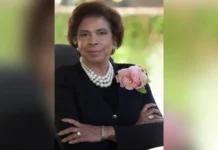
As the Democratic Party convenes the national convention in Chicago on August 19, the imprint of heroic warriors like Fannie Lou Hamer is indelible. She came to the 1964 convention seeking a seat at the table, to be seen and heard on behalf of farmers, sharecroppers, and rural communities in the poorest state in the nation. Her delegation was rebuffed by the Democratic powerbrokers.
Fast forward six decades. Who could imagine that a Black woman would be nominated to lead the ticket for the Democratic Presidential Campaign? It is in the spirit of Fannie Lou Hamer and countless Black women small “d” democrats who sacrificed blood and determination that we hail the nomination of Kamala Harris.
Sixty years ago, Fannie Lou Hamer led the Mississippi Democratic Freedom Party delegation to the Democratic Party National Convention in Atlantic City. They stirred controversy and concern, testing democracy at the same time they exposed the hypocrisy of the party leaders — both Southern segregationists and Northern patriarchs.
Demanding they be seated as state delegates, Fannie Lou Hamer, a passionate voting rights advocate, drew rapt attention as she shared the harrowing beating she experienced at the hands of Mississippi Police. She ended with this passionate oratory:
“All of this is on account we want to register, to become first-class citizens, and if the Freedom Democratic Party is not seated now, I question America. Is this America – the land of the free and the home of the brave, where we have to sleep with our telephones off the hooks because our lives are threatened daily because we want to live as decent human beings in America?”
Hamer’s testimony was so powerful that President Johnson, from Washington, D.C., contrived an impromptu press conference to divert national media attention away from Hamer’s passionate demands.
Adversity and struggle were familiar to the Mississippi toddler in rural Ruleville who was destined to back-breaking toil, poverty, and second-class citizenship. Like uncounted women who would precede and follow, hers was the unfinished business of Black women’s suffrage and citizenship.
Fannie Lou Hamer was both extraordinary and everywoman.
Her quest for citizenship was fused with intersectional advocacy for health, housing, education, and economic empowerment. By the time she was 6, Fannie Lou — the youngest of 20 children — would join her family in plantation work. Though stricken with polio, the youngster could bail up to 300 pounds of cotton a day.
Fannie Lou embodies what suffrage meant for Black women in the 20th Century. Like everywoman, she knew that making do with what she had was not enough. And as the activist extraordinaire, she would frontally take on the oppressive system: stared down peril, shot at, beaten, jailed, threatened, and told by a white supremacist, “…We’ll make you wish you were dead.”
Prolific as an organizer and visionary, Fannie Lou was a consummate collaborator across race and gender divides.
She launched Mississippi Freedom Summer with the Student Nonviolent Coordinating Committee and joined a coalition of White women to form the National Women’s Political Caucus. With the National Council of Negro Women, she also launched the Pig Project providing protein to impoverished sharecroppers, and to institutionalize rural self-sufficiency, she started the Freedom Farm Cooperative.
Never silenced or erased, she launched a campaign for Mississippi’s open U.S. Senate seat — five years before Shirley Chisholm’s successful run in the House.
Hamer’s activism was unrelenting, as were the maladies that sent her to an early grave at 59.
During surgery for the removal of a uterine tumor in 1961, she was “treated” with an unauthorized hysterectomy. This widely practiced forced sterilization of Black and Indigenous women was labeled by Fannie Lou as a “Mississippi appendectomy.”
In 1963, during the brutal assault by Mississippi police, she recalled being beaten so badly that her eyes were swollen shut. Hamer suffered long-term illness and trauma, including a blood clot in her left eye, kidney damage, and other injuries that never healed.
In the 1970s, faltering health and conditions described as “nervous exhaustion” slowed her activism. The trail she blazed for democracy and full citizenship would be followed by successive generations of Black women into this century.

Gwen McKinney is the creator of Unerased | Black Women Speak and is the founder of McKinney & Associates, the first African American and woman-owned communications firm in the nation’s capital that expressly promotes social justice and public policy.















